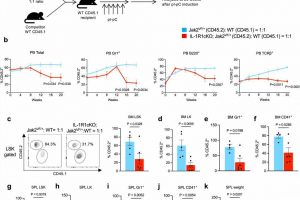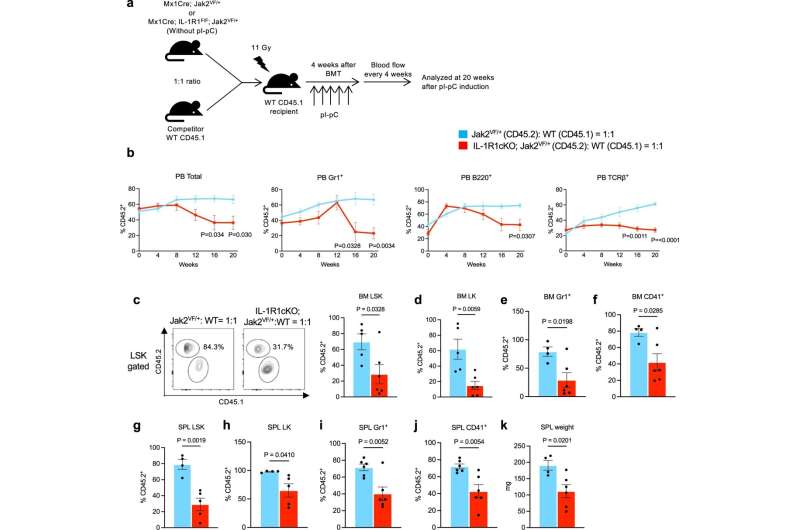Blood cancer research points to new treatment for bone marrow cancer


Pioneering research into the chronic inflammation often seen in certain blood cancers has identified a promising treatment approach for myelofibrosis, a potentially deadly bone marrow cancer.
The new research from UVA Cancer Center pinpoints an important contributor to the unrelenting inflammation associated with a group of blood cancers called myeloproliferative neoplasms. These cancers cause the bone marrow to produce too many blood cells. This leads to symptoms such as headache, fever, fatigue, weakness, bone pain, bleeding and enlarged spleen.
The research from UVA’s Golam Mohi, Ph.D., and colleagues provides new understanding on how cancerous bone marrow cells promote the development of myelofibrosis. They have identified a cytokine, called interleukin-1, that contributes to the progression of myelofibrosis. Targeting this cytokine could prevent myelofibrosis from progressing, the scientists report. This could spare bone marrow the harmful scarring that is the hallmark of the disease.
“The JAK2 inhibitors, ruxolitinib and fedratinib, are currently approved therapies for myelofibrosis but they do not significantly reduce bone marrow fibrosis. So, we believe that other factors in addition to JAK2 activation might be involved in the development of myelofibrosis,” said Mohi, of UVA Cancer Center and the University of Virginia School of Medicine.
“Our research provides new understanding on how inflammatory signaling mediated by interleukin-1 contributes to the development of bone marrow fibrosis and could lead to new therapeutic approach for this fatal bone marrow cancer.”
About myelofibrosis
A bone marrow transplant, to physically replace the diseased bone marrow, is the only potential cure now available for myelofibrosis. But that procedure is very taxing on the body and associated with many complications, making it risky for older patients (the group most likely to develop the cancer). Because not all patients are eligible for bone marrow transplants, new treatment options are needed badly.
UVA’s new discovery not only could provide a new treatment approach, it also sheds light on the fundamental mechanisms of progression of myeloproliferative neoplasms. Mohi and his team found that interleukin-1 (commonly called IL-1) is crucial to the development of myelofibrosis. Increasing it in lab mice accelerated bone marrow scarring and fueled the excess production of blood cells. Reducing it, on the other hand, had the opposite effect.
The researchers also looked at the levels of interleukin-1 in human patients. They found that these patients exhibited elevated levels of two forms of IL-1, bolstering the case for IL-1 or IL-1 receptor as a promising treatment target.
The researchers believe that IL-1 sends signals that amplify inflammation in the body and promote harmful changes in the bone marrow. They were able to block that process in lab mice using an antibody, reducing marrow scarring dramatically. Scientists may be able to adapt this approach or use other means to block IL-1 and stimulate similar benefits in human patients, though much more research and testing will be needed.
“Based on the findings from this study, we suggest that combination therapies targeting both JAK2 and IL-1 could be useful for treatment of myelofibrosis,” said Mohi, of UVA’s Department of Biochemistry and Molecular Genetics. “We hope that our exciting laboratory finding will translate into clinical trials and make significant improvement in the treatment of patients with myelofibrosis.”
Finding new and better ways to treat even the most challenging cancers is a key mission of UVA Cancer Center. Earlier this year, UVA became one of only 53 cancer centers in the country to be designated a Comprehensive Cancer Center by the National Cancer Institute. The designation recognizes elite cancer centers with the most outstanding cancer programs in the nation. Comprehensive Cancer Centers must meet rigorous standards for innovative research and leading-edge clinical trials.
Mohi and his collaborators have published their findings in Nature Communications.
More information:
Mohammed Ferdous-Ur Rahman et al, Interleukin-1 contributes to clonal expansion and progression of bone marrow fibrosis in JAK2V617F-induced myeloproliferative neoplasm, Nature Communications (2022). DOI: 10.1038/s41467-022-32928-3
Journal information:
Nature Communications
Source: Read Full Article